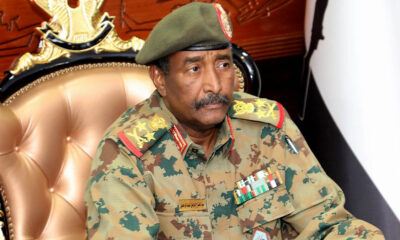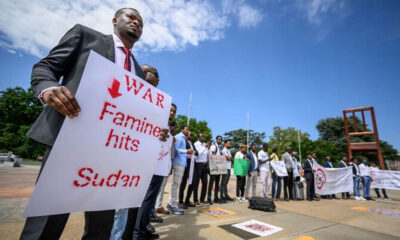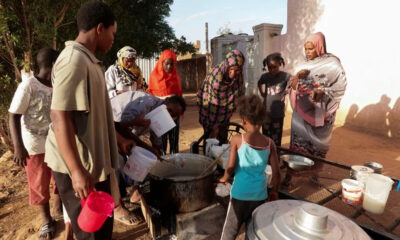Africa
Sudan’s army repels major assault on el-Fasher; kills RSF commander
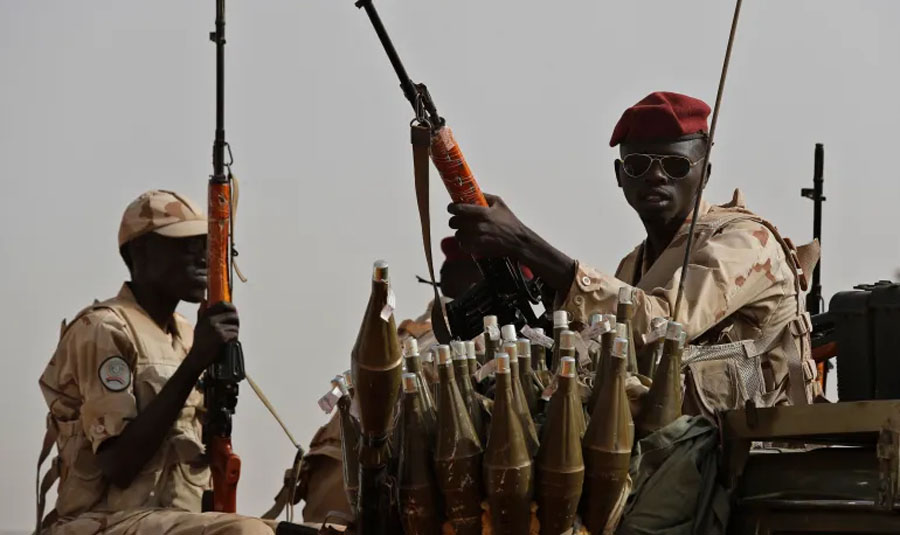
Sudan’s army repels major assault on el-Fasher; kills RSF commander
Sudan’s Rapid Support Forces (RSF) launched a major attack on el-Fasher in North Darfur a day after the UN Security Council demanded the militia halt its weeks-long siege of the city.
Sudan’s Armed Forces “aborted the attack and inflicted huge losses” with “hundreds” of dead and wounded in the failed RSF assault, it said in a statement.
Among those killed was a senior RSF commander, Ali Yagoub Gibril, and the attackers “fled from the battlefield”, it added.
No response from RSF was immediately available.
The conflict in Sudan broke out in April 2023 between the Sudanese Armed Forces (SAF), led by Abdel Fattah al-Burhan, and the RSF, which is loyal to General Mohamed Hamdan “Hemedti” Dagalo.
The violence has killed at least 14,000 people and displaced more than 10 million others, according to UN estimates. The UN and human rights groups have said they fear ethnic cleansing if RSF captures el-Fasher, a city of 1.8 million people and the last army stronghold in the Darfur region.
The war has created the worst humanitarian situation in the world, with an estimated 756,000 people in Sudan facing “catastrophic food shortages” by September.
‘Rape of our sisters and mothers’
Many Sudanese have joined the armed forces to fight back against the rampaging RSF.
Musa Adam was displaced from his city of Nyala in South Darfur. He told Al Jazeera the horrors committed by RSF soldiers made him join the SAF effort against the militia.
READ ALSO:
- Supreme Court gun ruling stuns Las Vegas shooting survivors
- Tinubu’s June 12 fall: Humour, karma, compassion, By Farooq Kperogi
- Minimum wage: New law to sanction defaulting states coming – Senate
“The displacement, the looting of civilians, the rape of our sisters and mothers is what made me join. The RSF took over Nyala and staying there became too dangerous. So I came here but joined to return to Darfur and fight the RSF.”
In North Darfur, RSF launched repeated attacks that led to the displacement of more than 130,000 people in the past month. Several mass graves have been reported in the state. Dozens of villages have been burned to the ground, mostly of ethnic Zaghawas.
Abu-Alqassim Mohammed, a former RSF officer, also joined the Sudanese Armed Forces.
“I reported to the army on the first day of the conflict against the RSF because it rebelled against the government. They stood against the army and against the country from day one. They killed civilians and forced them from their homes,” he said.
El-Fasher has become a focal point of the nearly yearlong war. The battle for the city – seen as crucial for humanitarian aid in a region on the brink of famine – has raged for more than a month.
The charity Doctors Without Borders, known by its French initials MSF, said on Friday fighting in el-Fasher has killed at least 226 people and wounded 1,418. The overall death toll is believed to be far higher with the wounded unable to get treatment amid continuing air raids, shelling and ground combat.
“The situation in el-Fasher is chaotic,” said Michel-Olivier Lacharite, head of MSF’s emergency programme.
‘Need the world to wake up’
The UN Security Council’s latest resolution calls for an immediate ceasefire, unhindered humanitarian access, and compliance with an arms embargo on Sudan, following a previous unsuccessful ceasefire call in March coinciding with Ramadan.
The United States on Friday announced $315m in emergency aid for Sudan warning a famine of historic proportions could be unfolding.
“We need the world to wake up to the catastrophe happening before our very eyes,” Linda Thomas-Greenfield, the US ambassador to the United Nations, told reporters.
“We’ve seen mortality projections estimating that in excess of 2.5 million people – about 15 percent of the population – in Darfur and Kordofan, the hardest-hit regions, could die by the end of September,” she said.
“This is the largest humanitarian crisis on the face of the planet, and yet somehow it threatens to get worse as the rainy season approaches.”
Sudan’s army repels major assault on el-Fasher; kills RSF commander
SOURCE: AL JAZEERA
Africa
South African woman shot dead by her police officer boyfriend on Christmas Day

- Lagos Imam to Tinubu: You haven’t disappointed us
- Ronaldo, Vinicius, Yamal win big at 2024 Globe Soccer Awards [Full list of winners]
- Vinicius should have won Ballon d’Or, not Rodri – Ronaldo
South African woman shot dead by her police officer boyfriend on Christmas Day
Africa
ECOWAS refutes claims linking Nigeria to terrorism sponsorship
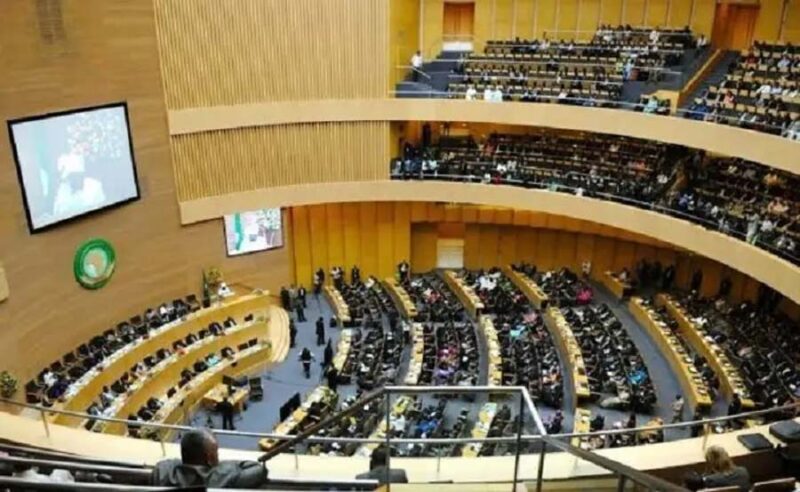
ECOWAS refutes claims linking Nigeria to terrorism sponsorship
The Economic Community of West African States has expressed concern over allegations directed at Nigeria and other member states, accusing them of sponsoring terrorism.
The commission in a statement on Thursday rejected the claims, describing them as unfounded and contrary to Nigeria’s longstanding commitment to regional peace and security.
It highlighted Nigeria’s leadership in the Multinational Joint Task Force, which had achieved significant successes in combating terrorism and maintaining stability in the West African region.
It stressed that Nigeria’s contributions extended beyond the subregion, underscoring the country’s role as a pillar of peace on the African continent.
ECOWAS refuted any suggestion that Nigeria, known for its generosity and dedication to stability, could be linked to terrorism sponsorship.
The commission urged all states in the region to prioritize dialogue and cooperation, calling for an end to baseless accusations that could undermine unity and peace efforts.
“The commission stands firmly with Nigeria and other ECOWAS member states against allegations that they are sponsoring terrorism.
“For years, Nigeria has supported the peace and security of several countries not only in the West African subregion but also on the African continent.
“ECOWAS therefore refutes any suggestion that such a generous and magnanimous country would become a state-sponsor of terrorism.
“ECOWAS calls on all states in the region to promote dialogue and stability and refrain from making accusations that are not supported by any evidence,” the statement read.
ECOWAS refutes claims linking Nigeria to terrorism sponsorship
Africa
Mozambique: Over 1,000 prisoners escape jail as election protests worsen
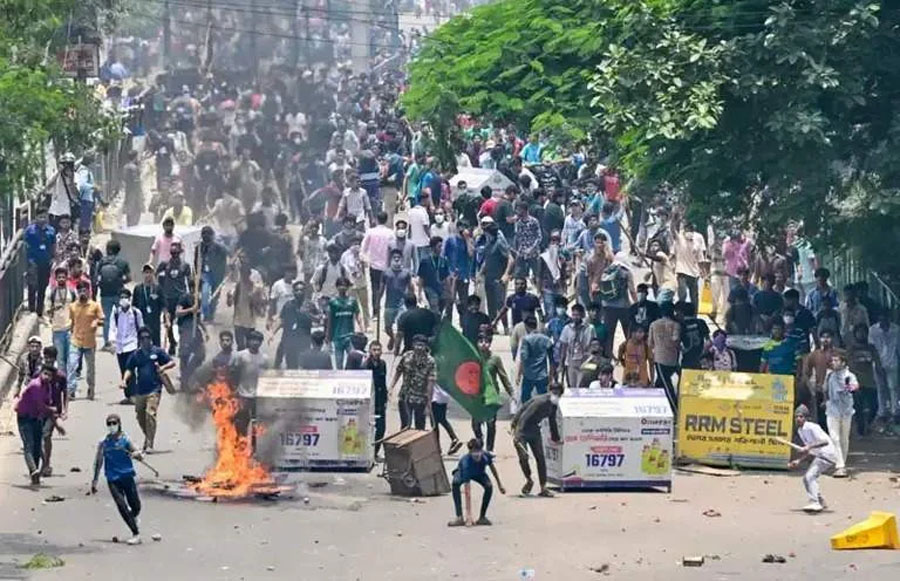
Mozambique: Over 1,000 prisoners escape jail as election protests worsen
No fewer than 1,500 prisoners have escaped from a prison in Mozambique, taking advantage of ongoing political unrest triggered by disputed election results, police say.
According to police chief Bernardino Rafael, thirty-three people were killed and 15 injured in clashes with guards.
About 150 more fugitives have since been recaptured, he added.
Protests broke out on Monday in response to Mozambique’s highest court confirming that the ruling Frelimo party, in power since 1975, had won October’s presidential elections.
Mr. Rafael stated that groups of anti-government protesters had approached the prison in the capital, Maputo, on Wednesday. Prisoners used the unrest to knock down a wall and escape, he said.
Mozambique has been rocked by civil unrest since disputed elections in October. Official results showed the ruling Frelimo’s candidate for president, Daniel Chapo, winning.
READ ALSO:
- Bandit leader Bello Turji threatens reprisals over arrest of close associate
- Real reason some women are unmarried in their 30s – Kanayo
- Media chat: Lawyer blasts Tinubu for encouraging Wike’s “rascality in public service”
Fresh protests erupted on Monday, when the constitutional court decided that Chapo had won the election but reduced his margin of victory.
In October, initial results showed Daniel Chapo with 71% of the vote versus Venâncio Mondlane’s 20%.
The court has now determined that he won 65% to Mondlane’s 24%. A BBC reporter discovered Maputo was like a ghost town on Christmas Eve, with practically all shops closed and residents remaining at home to avoid being caught up in the city’s worst unrest since Frelimo first took office in 1975.
Frelimo offices, police stations, banks, and factories have been robbed, vandalised, and set on fire around the country.
Mondlane, who has since fled Mozambique, had been urging his supporters to protest what he claimed was a corrupt vote. In a weekend social media statement, he predicted a “new popular uprising” if the outcome was not reversed.
Approximately 150 people have been killed in three months of protests following the elections.
Mozambique: Over 1,000 prisoners escape jail as election protests worsen
-
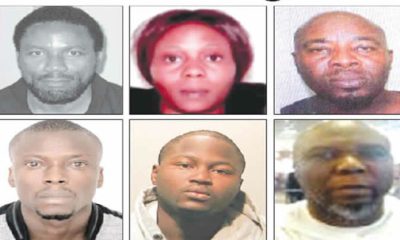
 metro3 days ago
metro3 days agoINTERPOL declares 14 Nigerians wanted for drug, human trafficking
-

 metro1 day ago
metro1 day agoJigawa State governor loses son 24 hours after mother’s death
-

 metro3 days ago
metro3 days agoIbadan stampede: She was treated like a terrorist, Queen Naomi’s sister says about her condition
-

 Business3 days ago
Business3 days agoNNPCL launches production monitoring centre
-

 Business2 days ago
Business2 days agoBe creative, monarch, others challenge Muslim professionals on economic revival
-

 Entertainment22 hours ago
Entertainment22 hours agoMultiChoice announces free access to all DSTV channels for 3 days
-

 metro16 hours ago
metro16 hours agoHeavy security in Ilesa as ex-Osun deputy gov emerges new Owa-Obokun
-

 Auto18 hours ago
Auto18 hours agoLSM MD extols founder’s qualities after latter posthumous industry award





